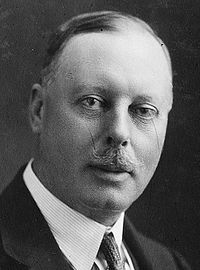|
Sir Horace Rumbold, 9th Baronet
Sir Horace George Montagu Rumbold, 9th Baronet, GCB, GCMG, KCVO, PC (5 February 1869 – 24 May 1941) was a British diplomat. A well-travelled man who learned Arabic, Japanese and German, he is largely remembered for his role as British Ambassador to Berlin from 1928 to 1933 in which he warned of the ambitions of Hitler and Nazi Germany. Background and educationRumbold was born on 5 February 1869 at St. Petersburg in the Russian Empire, the son of Sir Horace Rumbold, 8th Baronet and Caroline Barney (née Harrington). Horace was educated at Aldin House Prep School and at Eton.[1][2] CareerRumbold was an honorary attaché at The Hague (1889–1890), where his father was ambassador. In 1891, he passed the first of the required examinations and entered the Diplomatic Service.[1] After a year at the Foreign Office in London, he served in Cairo, Tehran, Vienna, Madrid and Munich between 1900 and 1913. He was then moved to Tokyo (1909–1913) and to Berlin (1913–1914).[1] In Berlin, he took up the position of counsellor. Rumbold was in charge of the British Embassy when the ambassador, Sir Edward Goschen, went home on leave on 1 July. Rumbold conducted negotiations in the first four of the ten days that preceded the outbreak of the First World War.[1] Rumbold left Berlin with the ambassador on 5 August 1914, with crowds attacking the embassy and their train.[1] In 1916, he was appointed ambassador to Berne.[3] After the war, he was appointed ambassador to Poland in 1919,[4] The following year, he became the High Commissioner to Constantinople during which he signed the Lausanne Treaty on behalf of the British Empire. He then became ambassador to Madrid from 1924 to 1928. Rumbold was appointed to his last position as ambassador to Berlin in 1928.[5] He supported appeasing Heinrich Brüning's government in the hope of staving off German nationalist parties such as Adolf Hitler's Nazi Party. Once Hitler came to power in 1933, Rumbold was deeply unsettled by the Nazi regime and produced a succession of despatches critical of the Nazis. On 26 April 1933 Rumbold sent to the Foreign Office his valedictory despatch in which he gave an unvarnished view of Hitler, the Nazis and their ambitions:
Rumbold concluded by giving stark warnings for the future of international relations:
Sir John Simon, the Foreign Secretary, found Rumbold's descriptions to be "definitely disquieting".[8] Ralph Wigram, an official in the Foreign Office, gave Winston Churchill a copy of this despatch in the middle of March 1936.[9] After Rumbold's death, Lord Vansittart said of him that "little escaped him, and his warnings [about Nazi Germany] were clearer than anything that we got later".[10] Walter Laqueur concurred by claiming that Rumbold's "prophetic" insights explained the Third Reich better than the expert opinions that were later issued from the OSS.[11] HonoursRumbold was made a Member of the Royal Victorian Order (MVO) in 1907, a Knight Commander of the Order of St Michael and St George in 1917,[12] sworn of the Privy Council in 1920[13] and appointed a Knight Grand Cross of the Order of St Michael and St George (GCMG) in 1922.[14] Personal lifeRumbold married Etheldred Constantia Fane, younger daughter of the British diplomat Sir Edmund Douglas Veitch Fane (1837–1900)[a] by his wife Constantia Wood,[b] a niece of the 3rd Earl of Lonsdale, on 18 July 1905. On his father's death in November 1913, Horace succeeded him as 9th baronet.[1] They had one son and two daughters; the younger daughter died young in 1918. Lady Rumbold's only brother Henry Nevile Fane was married in 1910 (divorced 1935) to the elder daughter of the 21st Baron Clinton, and the Rumbolds were thus indirectly related to the British royal family after 1923.[c] Rumbold retired due to his age in June 1933, though he later served on the Peel Commission for Palestine. He died on 24 May 1941, aged 72, at his home in Tisbury, Wiltshire.[2] He was succeeded in the baronetcy by his son, Anthony, who also became a distinguished diplomat. Notes
References
Bibliography
Further reading
External linksWikimedia Commons has media related to Horace Rumbold. |
||||||||||||||||||||||||||
